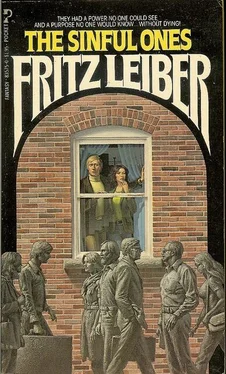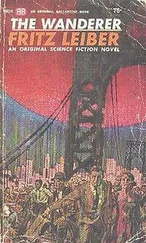The ropes turned black, merged with the darkness, disappeared, and collapsed down into something soft and clinging.
Hitching himself up, he realized that he was in his own room, in his own bed, fighting the bedclothes.
He shakily thrust his feet out of bed and sat on the edge of it, waiting for the echoes of his nightmare to stop whirling through his senses, for his skin to lose its hot, tight, tingling feel.
His head ached miserably. Lifting his hand, he felt a large sensitive lump. He recalled the small dark man hitting him.
Pale light was sifting through the window. He got up, went over to the bureau, opened the top drawer. He looked at the three pint bottles of whiskey. He chose the quarter full one, poured himself a drink, downed it, poured another, looked around.
The clothes he had been wearing were uncharacteristically laid out on a chair.
His head began to feel like a whirlpool. He went over and looked out the windows.
But instead of an empty street, open bedroom windows, flapping shades, and the other insignia of dawn, Carr saw a brisk little throng moving along the sidewalks. Windows were mostly lighted and advertisements were blinking. Unwillingly he decided that he must have been unconscious not only last night, but also all of today.
A coolness on his fingers told him that whiskey was dribbling out of the shot glass. He drank it and turned around. A gust of anger at the small dark man (is your friend!) went through him.
Just then he noticed a blank envelope propped up on the mantelpiece. He took it down, snapped on a light, opened it, unfolded the closely scribbled note it contained. It was from Jane.
>I’m sorry about last night. Fred is sorry too, now that he knows who you are. He was hiding in my bedroom and heard the others come in, and he through you were one of them when you came sneaking through.
Don’t try to find me, Carr. It isn’t only that you’d risk your own life. You’d endanger mine. Fred and I are up against an organization that can’t be beaten, only hidden from. If you try to find me, you’ll only spoil my chances.
You want to have a long happy life, get married, be successful, don’t you? You don’t want your future changed, so that you have only a few wretched months or hours ahead of you, before you’re hunted down? Then your only chance is to do what I tell you.
Stay in your room all day. Then arrange your things just as you usually do before going to work in the morning. You must be very exact —a lot depends on it. Above all, burn this letter —on your honor do that. Then dissolve in a glass of water the powders you’ll find on the table beside your bed, and drink them. In a little while you’ll go to sleep and when you wake up, everything will be all right.
Your only chance to get clear of the danger you’re in, and to help me, is to do exactly as I’ve told you. And forget me forever.
<
Carr walked to the bed. On the little table, leaning against an empty tumbler, were two slim paper packets. He felt one between finger and thumb. It gritted. He put it back.
He glanced again at the letter. His head began to ache stabbingly. Why, what sort of a nincompoop did they think he was? And what would she be saying next—“So sorry we had to poison you?” “Don’t try to find me…burn this…on your honor…forget me forever…” What nauseous melodrama! Did she think such cheap phrases would soothe him into putting up with what had happened? Yes, she was romantic, all right—the romantic little dear who throws her arms around you and rubs her belly against yours so her boyfriend can stick a gun in your ribs.
He’d blundered into a pretty nasty affair, and maybe he’d picked the wrong side.
And she did have a reason to lie. She might lie to scare him off, to keep him from discovering what sort of hanky-panky she and he precious small dark man with glasses were up to, maybe to gain time for some sort of getaway. (Don’t stir out of your room today.)
He hurriedly began to throw on his clothes, wincing when the jabs of pain came. After shouldering into his topcoat, he drained the last shot from the whiskey bottle, tossed it back in the drawer, looked at the full bottles a moment, stuck one in his pocket, went out, glaring savagely at the mirror-imprisoned Carr on the stairs.
He walked a half block to the nearest hotel and waited for a cab. Two cruised by with their flags up, but the drivers ignored his arm-wavings and calls. He ground his teeth. Then a third cab approached and this one drew into the curb, but just as he was getting ready to board it, two fur-coated blondes from the hotel swept by him and piled in. He swore out loud, turned on his heel and started walking.
It was a pleasantly mild evening and he detested it. He felt a senseless rage at the people he passed.
How nice it would be to smash all the neon signs, rip down the posters, break into the houses and toss out of the windows the crooning, moaning, blatting radios and televisions. Come the atom bomb!
But for all that, the fresh air was helping his head. As he neared Mayberry Street, he began to calm down, or at least focus his anger.
Halfway down the block a car was parked with its motor softly chugging—a convertible with the top down. Just as he passed it, he saw a man come out of the entry to the Gregg apartment. A rather heavily built man. He strolled off in the opposite direction. But before he turned, Carr had recognized him. Mr. Wilson!
Repressing the apprehension that surged through him, Carr made a snap decision. Stepping rapidly and decisively, he started after Mr. Wilson.
But just then a voice behind him said, “If you value your life or your reason, keep away from that guy.” At the same time a hand gripped his elbow and spun him around.
This time the small dark man with glasses was wearing a black, snap-brim hat and a tightly buttoned trench coat rather too long for him, suggesting a robe. And this time he didn’t look terrified, in spite of his pallor. Instead he was sardonically smiling.
“I knew you wouldn’t stay in your room,” he said. “I told Jane her letter would have just the opposite effect.
Carr doubled his fist, swung back his arm, hesitated. Damn it, he did wear glasses—pitifully think-lensed ones.
“Go ahead,” said the small, dark man. “Make a scene. Bring them down on us. I’m past caring.”
And then he did something astonishing. He threw back his head, raised his arm in a theatrical gesture, and with a certain rakish coolness intoned, “If it be now, ’tis not to come; if it be not to come, it will be now; if it be not now, yet it will come; the readiness is all.”
Carr stared at the glasses bright with reflected street light.
“Hamlet,” said the small dark man. “Act five, scene two. The first quotation was from The Hound of the Baskervilles.” He paused and studied Carr, his glasses gleaming hypnotically. “You wouldn’t think, would you,” he mused, “that as we stand here in this respectable neighborhood, conversing quietly, that we are both in deadly peril.” He smiled. “No, I’m sure you wouldn’t think that.”
“Listen,” said Carr suddenly, advancing again with baled fist. “You slugged me last night.”
“So I did,” said the small man, rocking on his heels.
“Well, in that case—” Carr started, and then he remembered Mr. Wilson. He whirled around. The portly man was nowhere in sight. He took a few steps, then checked himself abruptly, looked back. The small dark man was rapidly walking toward the purring convertible. Carr darted after him, sprang to the running board just as the other slipped behind the wheel.
“You wanted to distract me until he was gone,” Car accused.
Читать дальше









